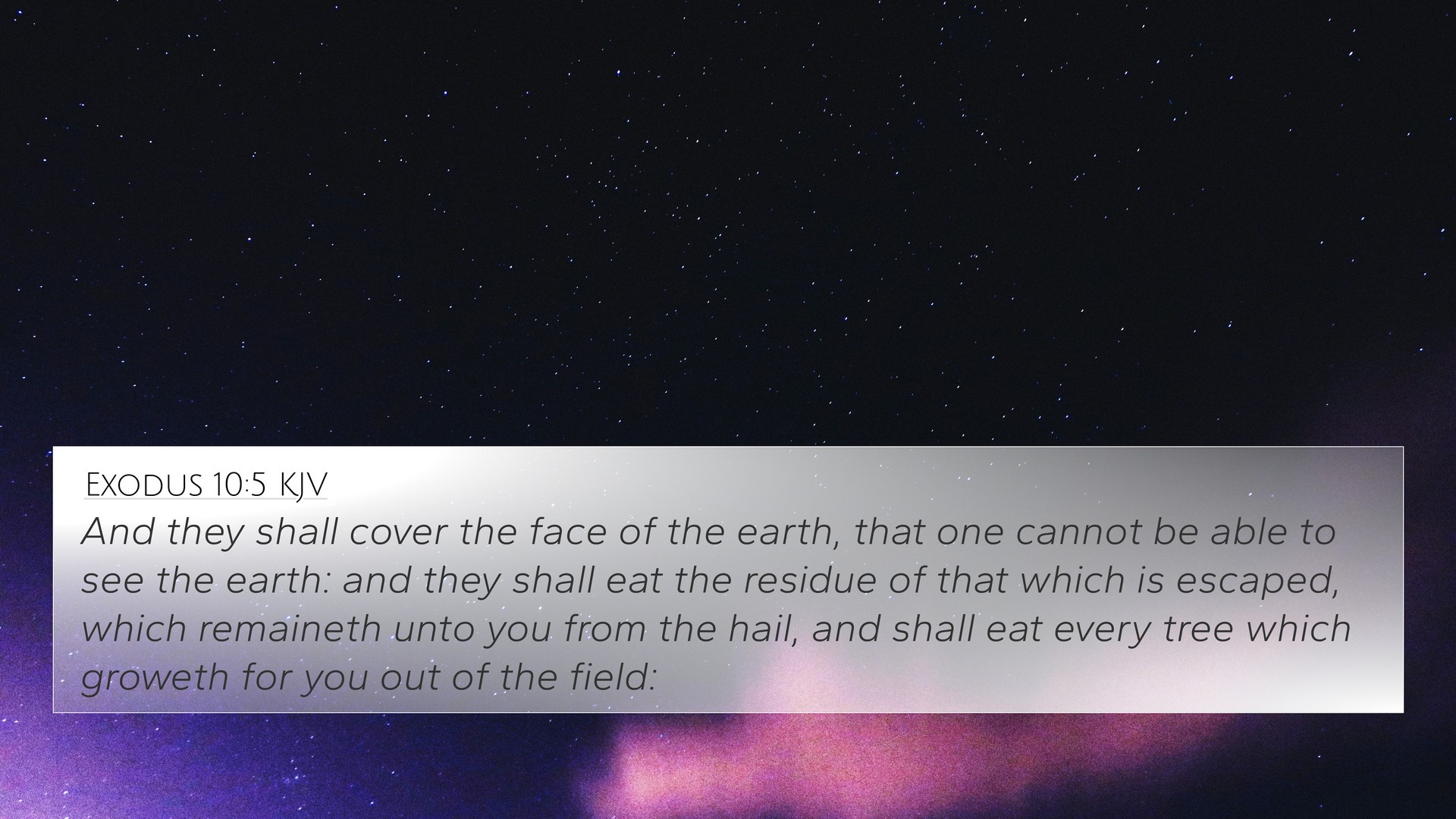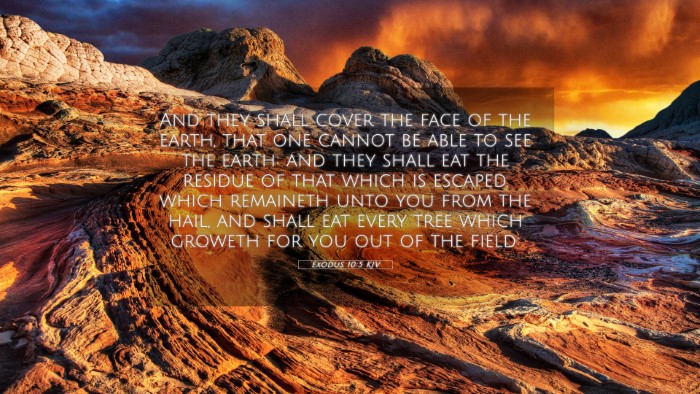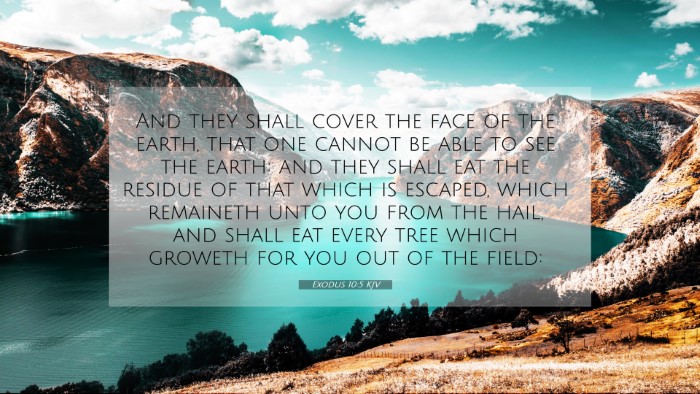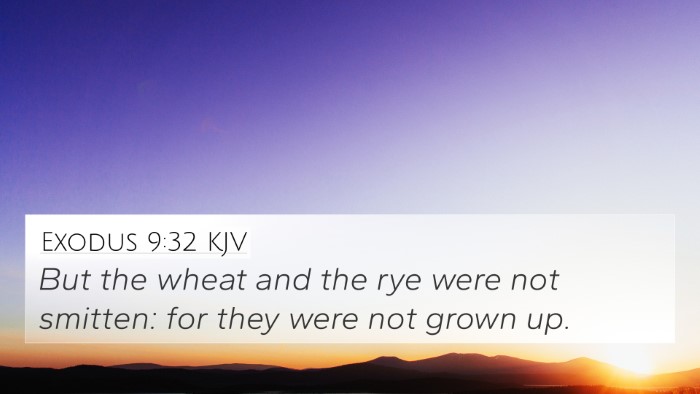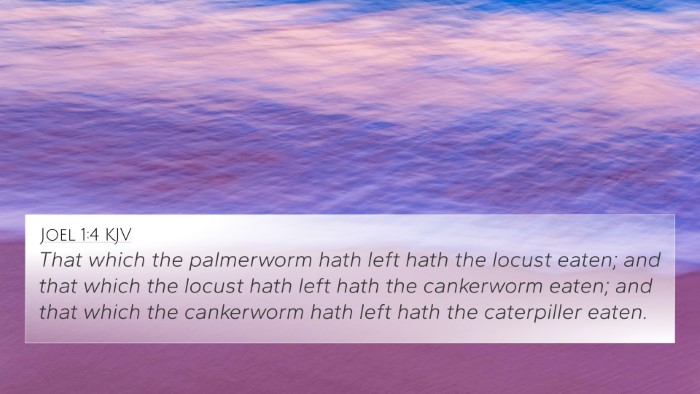Understanding Exodus 10:5
Bible Verse: Exodus 10:5
Verse Text: "And they shall cover the face of the earth, that one cannot be able to see the earth: and they shall eat the residue of that which is escaped, which remaineth unto you from the hail, and shall eat every tree which groweth for you out of the field." (Exodus 10:5 KJV)
Summary of Exodus 10:5
This verse is part of the narrative describing the eighth plague of Egypt, where locusts are sent to devastate the land. The imagery used reveals not only the severity of the plague but also God’s control over creation and His judgment against Pharaoh's refusal to release the Israelites.
Commentary Insights
-
Matthew Henry:
Henry emphasizes the overwhelming nature of the locusts, which would cover the land so completely that the earth itself would be obscured. This serves both as a sign of God's power and as a judgment against Egypt’s idolatry, where the locusts symbolize the attack on the agricultural deity of Egypt.
-
Albert Barnes:
Barnes elaborates on the locusts' ability to consume whatever remained after the plague of hail. This highlighted God's complete dominion, as even the elements of nature were employed as instruments of His will. The consumption of the crops signifies a total devastation of Egyptian resources, further crippling Pharaoh's resolve against God.
-
Adam Clarke:
Clarke discusses the locusts not only as a physical plague but as a spiritual lesson for the Israelites and Egyptians alike. He notes that God’s judgment serves a dual purpose: it imposes immediate consequences on Egypt and demonstrates to Israel that their deliverance is assured through God’s might.
Theological Themes
Exodus 10:5 emphasizes themes of judgment, divine authority, and the protection of God’s chosen people. It serves as a reminder of the consequences of disobedience to God’s commands and His sovereignty over all creation.
Cross-References to Exodus 10:5
- Exodus 10:4: Discusses the announcement of the locust plague as part of the narrative of God's plagues upon Egypt.
- Exodus 8:21: References the previous plague of flies and sets the stage for the growing severity of God's judgments.
- Joel 1:4: A prophetic reference that uses locusts as a metaphor for judgment and devastation.
- Psalm 105:34-35: Reflects on God's miracles in Egypt, including striking down crops, aligned with Exodus 10:5.
- Deuteronomy 28:38: Discusses the consequences of disobedience, which can be illustrated through the plagues, including locusts.
- Matthew 24:22: Alludes to catastrophic events that may be likened to the locust plague in Exodus.
- Revelation 9:3: Mentions locusts as instruments of judgment in a prophetic context, drawing thematic parallels with Exodus.
Insights on Comparative Bible Verse Analysis
The analysis of Exodus 10:5 can be enriched by exploring cross-references. By doing so, one identifies the connections between various Biblical texts that share similar themes or narratives. For example, studying the locusts in Exodus alongside references in the prophets provides deeper insights into God's judgment.
Connections between Bible Verses
Creating linkages between scriptures, such as between Exodus and prophetic books like Joel, can reveal the ongoing themes of divine judgment and mercy throughout the scripture. These connections form a retrospective understanding of God's dealings with His people and His creation.
Tools for Bible Cross-Referencing
For those interested in cross-referencing Biblical texts, several tools and methods can enhance understanding:
- Bible Concordance: A systematic index of Biblical terms and verses.
- Bible Cross-Reference Guide: Provides thematic connections between verses.
- Cross-Reference Bible Study: Methods to identify relations among scriptures.
- Bible Reference Resources: Books and tools dedicated to finding links between verses.
How to Use Bible Cross-References
Utilizing a Bible cross-reference system can enhance one’s study. For instance, when exploring themes of judgment in Exodus 10:5, one may cross-reference Deuteronomy 28:38 to understand the broader context of disobedience and outcomes within both the narrative of Exodus and the schemas of laws set forth by Moses.
Applying the Insights
Understanding Exodus 10:5 within the framework of Biblical theology encourages believers to reflect on God’s nature—not only as a sovereign judge but as a protector of His covenant people. The plagues serve as reminders of the seriousness of sin and the lengths God will go to deliver His people.
Conclusion
In conclusion, Exodus 10:5 is a profound verse that showcases God's power through the devastating plague of locusts. By utilizing cross-references and comparative analysis, one can gain a richer understanding of God's character and His historical actions, which inform current beliefs and practices. This understanding is vital for those studying how various Bible verses relate to one another and the thematic messages conveyed through scripture.
